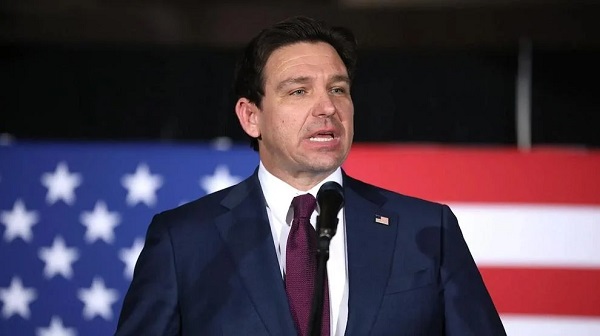From The Center Square
By
The governors of Texas and Florida have declared the nation’s largest Muslim advocacy group a foreign terrorist organization, but they may stand alone. None of their Republican counterparts in other states seem ready to follow suit.
The Center Square reached out to every other Republican governor whose state has offices of the nonprofit Council on American-Islamic Relations. Not one – from Alabama, Georgia, Missouri, Ohio, Oklahoma or Virginia – responded to inquiries about whether they plan to slap a terror label on the group, too.
“I don’t know why anyone wouldn’t want to designate CAIR a foreign terror organization,” Florida Republican Congressman Randy Fine, a fierce critic of the group, told The Center Square.
The 31-year-old, Washington-based civil rights organization strongly denies supporting terrorism, saying on its website it has “specifically opposed unjust violence perpetrated in the name of Islam.”
The U.S. State Department does not consider CAIR a foreign terrorist organization, though U.S. Rep. Fine introduced a bill this year that would direct Secretary of State Marco Rubio to review if it meets the criteria.
“Maybe other states are waiting to see how it goes,” Fine said of the governors’ non-responses. “CAIR is threatening litigation, which I think we all hope happens because that will require them to disclose the dark web of relationships that they have.”
Last month, Texas Gov. Greg Abbott issued a proclamation accusing the group of ties to Hamas and the Muslim Brotherhood, an international organization bent on establishing Islam’s “mastership of the world.” The designation prohibits CAIR from buying or acquiring land in Texas.
Florida Gov. Ron DeSantis issued his own executive order last week, also designating both CAIR and the Muslim Brotherhood terrorist groups. He called on state agencies to deny resources to them and directed the Florida Department of Law Enforcement and Florida Highway Patrol to keep tabs.
“CAIR was founded by persons connected to the Muslim Brotherhood,” DeSantis’ order says, “and was created, in the words of persons affiliated with CAIR, as ‘an official U.S. cover representing the Islamic community’ to conceal ties to Islamic extremist groups.”
CAIR and the Muslim Legal Fund of America have already sued in Texas, asking a federal judge to strike down Abbott’s order. CAIR has threatened to sue DeSantis, as well. The group says its pro-Palestinian stance has attracted the ire of “Israel-first” politicians.
“It seems to be a coordinated campaign to push back against anyone who spoke out against the genocide effectively,” CAIR spokesman Ibrahim Hooper told The Center Square.
In a letter to DeSantis last week, CAIR National Deputy Director Edward Ahmed Mitchell called the executive order “defamatory” with “no basis in law or fact.” The organization has never been an affiliate, offshoot, or subsidiary of any foreign group, he said.
“You do not have the constitutional authority to unilaterally declare any Americans or American institutions foreign terrorist groups, nor is there any basis to level this smear against our organization.” Mitchell told the governor. “We look forward to seeing you in a court of law, where facts and the law still matter.”
DeSantis said in an X post last week, “I look forward to discovery – especially the CAIR finances. Should be illuminating!”
According to its website, CAIR has chapters in Austin, Dallas and Houston. In Florida, it has a Tampa chapter.
At least 21 other states have chapters and satellite offices, six of which have Republican governors. There are branches in Birmingham, Ala.; Duluth, Ga.; St. Louis; Cincinnati, Cleveland and Columbus, Ohio; Oklahoma City; and Herndon, Va., the website says.
The Center Square contacted the offices of Alabama Gov. Kay Ivey, Georgia Gov. Brian Kemp, Missouri Gov. Mike Kehoe, Ohio Gov. Mike DeWine, Oklahoma Gov. Kevin Stitt, and outgoing Virginia Gov. Glenn Youngkin – asking if they’re planning to do anything similar to Texas or Florida or to comment on what Abbott and DeSantis did.
None answered.
“Most Americans recognize that Ron DeSantis is a failed politician,” Mitchell, of CAIR, told The Center Square, “who prioritizes the Israeli government over the people of Florida and is always looking for publicity stunts to stay relevant. I would not be surprised if other governors do not decide to take the leap with him and Governor Abbott, given they don’t want to end up in court and embarrassed.”
The Texas proclamation and the Florida order delve deep into the organization’s history to accuse it of ties to Hamas and the Muslim Brotherhood, a transnational Sunni Islamist network with no centralized leader that pushes for Sharia law in all aspects of life. The Muslim Brotherhood also has not been designated a foreign terrorist organization by the State Department, though President Trump issued an executive order last month launching a formal process that could see some of its chapters labeled as such.
The Texas and Florida actions both cited CAIR’s role as an unindicted co-conspirator in the 2007-2008 federal trial of the Holy Land Foundation, Its leaders were found guilty of funneling funds to Hamas.
“Internal documents plainly identified CAIR as a subsidiary of the Muslim Brotherhood and a federal court eventually found ‘ample evidence to establish’ that CAIR was associated ‘with Hamas,'” Abbott’s proclamation says.
The Texas document also lists a half dozen staffers and associates as being criminally convicted or deported for financing or supporting terrorist causes, including Al Qaeda, the Taliban and Saddam Hussein’s government.
Anti-Muslim activist Amy Mekelburg, founder of RAIR (Rise Align Ignite Reclaim) Foundation USA, has been urging other states to join Texas and Florida with designations of their own.
“ALL Red states with CAIR offices must act NOW – before CAIR’s influence becomes irreversible,” Mekelburg said in an X post last week. “Every red governor. Every red AG. Every red legislature.” She did not respond to The Center Square’s attempts to reach her, and CAIR has labeled RAIR a “hate group.”
While no governors have gone as far as Abbott and DeSantis, other state legislatures passed non-binding resolutions introduced over the past decade telling law enforcement and other state agencies to stop cooperating with CAIR.
When he was still a state representative last year, Fine introduced a resolution passed in the Florida House encouraging state and local governments to cut off contacts with the group, just as the FBI did more than a decade ago citing alleged ties to Hamas.
“They’ve made themselves out to be the NAACP for Muslims,” Fine said. “And I think it’s a very interesting thing, because if they’re the NAACP for Muslims, what does that say about Muslims?”
Last week CAIR called for Fine’s resignation over an X post where he said of mainstream Muslims, “I don’t know how you make peace with those who seek your destruction, I think you destroy them first.”
And Mitchell said the tactics being used against CAIR do hearken back to the NAACP, when southern states tried to shut it down in the 1960s by accusing its members of plotting with communists and seeking access to finance records and membership lists. He called the allegations in the Texas and Florida orders either factually inaccurate, or “a true fact that has been manipulated to sound nefarious and much worse than it is.”
The Holy Land Foundation trial was “one of the most notoriously-flawed and widely-criticized excesses of the post-9/11, War on Terror, Bush era,” he said. And of Abbott’s list of criminal convicts, “Some of those people did not work for CAIR at all whatsoever. None of them did anything criminal in relation to CAIR at all. And some of them were wrongly convicted of things they did not do.”
“CAIR is probably target number one for anti-Muslim bigots. They absolutely hate us because we defend the Muslim community, and we’re very, very good at it,” Mitchell said. “The NAACP was not a communist agent. We do not have any connection with any foreign entity. We’re an independent American organization, and Ron DeSantis is going to find that out.

















